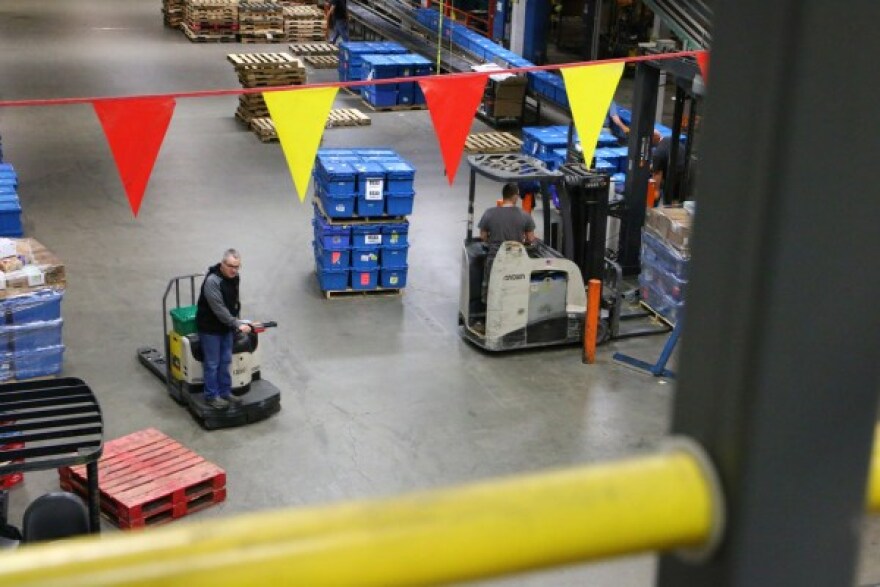Business is booming at the 36-room Edgewater Motel in Old Orchard Beach, but owner Pierre Janelle worries as towel, sheet and pillowcase inventories dwindle, with orders from April still unfilled.
Randy Coulton, co-owner of the Kamp Kamp Moosehead Lake Indian Store in Greenville, can’t get enough T-shirts to sell to tourists and hardware is backordered. The restaurant he owns in Ogunquit is closed Tuesdays because pizza flour, paper supplies and canned items are hard to buy.
At Peace, Love & Waffles in Dover-Foxcroft, single-serve apple juice, whipping cream and bacon supplies are inconsistent, if manager Michael Begley is able to get them at all.
There’s enough blame to go around when it comes to the causes of the pervasive shortages, from manufacturers having to ramp up extraordinarily quickly as post-pandemic demand skyrockets to not enough truck drivers, mechanics or parts to fix them to keep supplies moving through the distribution system.
Workforce shortages in every industry are the reason businesses most frequently cited for the normally predictable supply chain to be in such broad disarray. Supplies aren’t likely to return to normal until next year, experts said, and those disruptions have caused some businesses to curtail hours or limit menus and other choices for consumers.
“I have to do a lot of scrambling just to make sure we have supplies, which means going to multiple vendors,” Janelle said.
The widespread shortages, which started with the well-publicized panic-buying of toilet paper, sanitizers and canning jar lids early in the pandemic, continue to ripple through a wide swath of businesses at the same time the U.S. economy returned to pre-pandemic levels in the second quarter of this year. Maine’s gross domestic product still fell short of its pre-pandemic mark but is growing quickly.
Some 87 percent of small business owners across the nation polled by the National Federation of Independent Businesses reported they are affected by supply chain disruptions on products including computer chips, meat, lumber and plastic containers. More than half said the disruptions are worse now than three months ago and they expect shortages to continue for at least five more months. About 60 percent reported ongoing staffing shortages.
Maine’s beleaguered hospitality industry is seeing a summer season that may surpass the record high in 2019, but staffing shortages and supply chain disruptions are stressing businesses, employees and customers, said Steve Hewins, executive director of HospitalityMaine Education Foundation, an industry group.
Pent-up demand explains part of the worsening disruptions, Meghan Cieslak, spokesperson for the Virginia-based International Foodservice Distributors Association trade group, said. But consumer tastes also have shifted during the pandemic as buyers moved to online and pick-up orders rather than brick-and-mortar locations, making people’s buying habits less predictable.
“It’s a lot for businesses to address so many things at once,” she said.
Cieslak said the truck driver shortage, caused by an aging workforce with an average age of 46, is a major issue in the distribution chain. A recent survey found that more than 15,000 driver positions are open in food service distribution alone, and managers have had to drive trucks, she said. The average truck driver job pays $70,000 a year, she said.
Warehouse and distribution companies also are struggling to hire enough staff. ADUSA Distribution, a sister company to Hannaford supermarkets that distributes products to its stores, is trying to hire 60 people for stocking jobs, order pickers and production associates across its three Maine warehouses in Winthrop, Saco and South Portland, adding to the more than 500 already employed. It has nudged up its pay scale by between $3 and $4 hourly, with starting positions paying $16.50 and experienced workers getting up to $26.

Demand for products increased more than 100 percent overnight when the pandemic started, and although it has stabilized since then, product volumes in the distribution center are still higher than normal, Grant Thomas, human resources director at ADUSA, said.
“That’s kept demand for our distribution services high, and we’re staffing to support that increased volume,” he said.
Some retailers are still seeing orders reduced or taking an extra day to arrive, Christine Cummings, executive director of the Maine Grocers & Food Producers Association, said. Prices are rising significantly for certain products, notably packaging materials.
Shortages at the start of the pandemic came from stocking-up by consumers, but more recently they are from limitations in available raw materials, record flooding and fires, labor shortages and higher-than-anticipated demand, she said.
Cummings said there is no quick remedy for the shortages, but some parts of the supply chain are making changes. Manufacturers are streamlining the products they offer and packaging sizes to expedite production, she said. Retailers have sought alternative suppliers, which has had positive effects locally.
“This has opened the door for many locally produced goods to fill some gaps created by inventory disruptions,” Cummings said.
This story appears through a media partnership with the Bangor Daily News.


